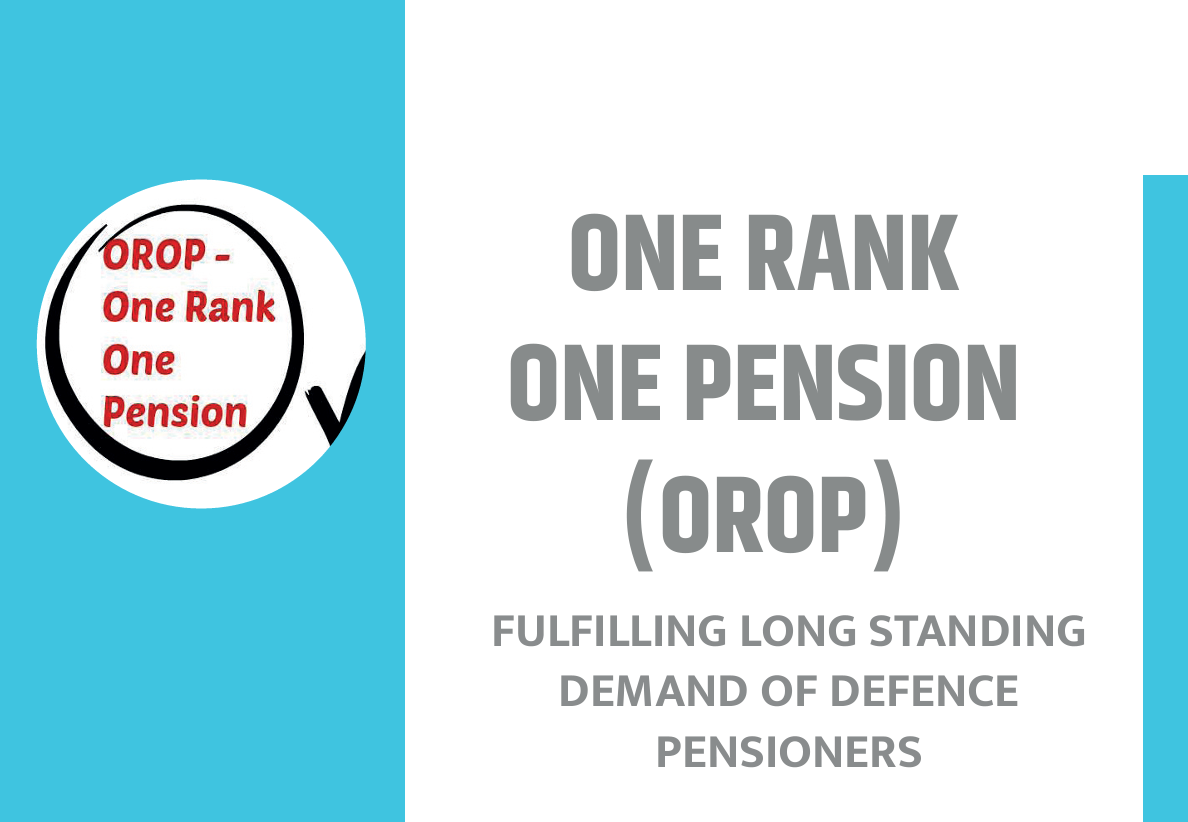

OROP or One Rank One Pension, means that retired soldiers with the same rank and years of service should receive the same pension, no matter when they retire. The idea is to fix differences in pensions for ex-servicemen who retired before and after various pay commissions, which updated salaries and pensions for government employees over time. OROP is a way of treating veterans equally and showing respect for their service to the nation.
Before OROP, pensions were based on the Pay Commission recommendations at the time of retirement. This caused issues where people of the same rank but retiring at different times got different pension amounts. OROP aims to solve this by making sure that those who retire with the same rank and years of service get the same pension, regardless of their retirement date.
To make OROP work, pension rates for Ex-Servicemen are regularly reviewed and adjusted to match the pensions of those retiring with the same rank in the future. OROP has been a significant matter in many countries, like India, where Armed Forces Veterans have pushed for fairness and equality in pension benefits. Implementing OROP intends to address the concerns of military personnel about pension differences and improve the financial security of retired servicemen and women.
How Current Pension system work?
The pension is the amount of money that a retired person gets from the government or an organization after they stop working. The pension is usually based on the salary that the person earned when they were working. The pension is calculated based on the salary at the time of retirement. Fifty per cent of the last salary drawn is typically the pension over and above which you get the other allowances. In the current system, the salary at the time of retirement determines the pension, not the service years.
This means that two people who have the same rank and the same length of service may get different pensions if they retire at different times and have different salaries. This system can create gaps and inequalities in the pensions of different retired people. Some retired people may feel that they are not getting a fair and adequate pension for their service and sacrifice. This is why some retired people demand a different system of pension calculation, such as the One Rank One Pension (OROP) scheme.
What is the present issue with the Defence Pension?
The Defence pension is different for different retired soldiers depending on when they retired and how much they earned. The present issue with the Defence pension is that some retired soldiers get less money than others who have the same rank and the same service years.
For example, a high-ranking officer who retired in 1995 will get 10% less money than a lower-ranking officer who retired after 2006. Also, a soldier who retired in 1995 will get 80% less money than a soldier who retired on or after 1 January 2006. The main demand of OROP is to remove this difference and make the Defence pension equal for all retired soldiers who have the same rank and the same service years.
Arguments in Favor of OROP:
Shorter Service Period for Soldiers: Supporters argue that military personnel are required to retire at a younger age (around 33 to 35 years) to maintain a younger and more agile army. In contrast, civil employees at the age of 60. They believe it is the state’s moral obligation to ensure the well-being of soldiers who dedicate their service to the nation.
Impact on Morale: Advocates state that having a lower pay status compared to civilian counterparts, despite a shorter service period, can negatively affect the morale of the Armed Forces. Equalizing pensions through OROP is seen as a way to address this disparity.
Issues of Justice, Equity, Honour, and National Security: Supporters emphasize that the demand for OROP is rooted in principles of justice, equity, honour, and national security, making it a matter of importance for the well-being and recognition of veterans.
Challenges and Difficulties:
Financial Hurdle: Opponents highlight the significant financial challenge of implementing OROP, estimating a cost of 8000-10000 crore rupees. They express concerns that this cost would increase with each subsequent revision of salaries.
Expenditure on Arrears: Critics argue that the expenditure on arrears, which could be around 10000 crore rupees, poses a substantial financial burden. They also fear that meeting this demand could lead to similar demands from other armed forces personnel, such as CRPF and CISF.
Administrative Challenges: Implementing OROP is considered an administrative challenge due to the lack of records spanning many decades. This poses difficulties in accurately determining and providing retroactive pension adjustments for retired military personnel.
Overall OROP is about whether retired soldiers should get the same pension or not. Some people think it is fair and right to give them the same pension. Some people think it is hard and costly to do that.
Origin of OROP
It started in 1973 when Prime Minister Indira Gandhi, who was the leader of the Congress party, stopped the One Rank One Pension (OROP) system. OROP has been the basis for determining the pensions of Indian Armed Forces personnel for 26 years since independence. The Prime Minister stopped through an administrative order issued unilaterally.
The retired soldiers were unhappy because the 3rd Pay Commission gave more money to the civilians but less money to the soldiers. This made the problem of OROP worse. The 4th and 5th pay commissions talked about OROP but did not do anything to solve it. The retired soldiers protested and gave back their medals to show their anger.
How rank pay affected the armed forces and created pension disparities
Rank pay was a scheme implemented by the Indian National Congress (INC) under the leadership of Rajiv Gandhi in 1986. This decision came in the aftermath of the recommendations made by the 4th Central Pay Commission. Under this scheme, the basic pay of seven ranks in the armed forces, including 2nd Lieutenant, Lieutenant, Captain, Majors, Lt. Colonel, Colonels, Brigadiers, and their equivalents in the Air Force and Indian Navy, was reduced by fixed amounts designated as rank pay.
The reduction in grade Pay, as a result of the introduction of rank pay, had various consequences. It led to imbalances in the rank equivalence between officers from the Indian Police Service (IPS) and the Armed Forces. Moreover, this change affected the basic pay, allowances, promotion prospects, status, and pensions of thousands of officers in the Armed Forces, both at the time of its implementation in January 1986 and for decades thereafter.
The Koshiyari committee’s report and recommendations on OROP
In 2011, the government formed a 10-member parliamentary committee led by Bhagat Singh Koshiyari to examine the One Rank One Pension (OROP) issue. This committee was tasked with investigating and providing recommendations on the matter. In 2012, the committee submitted its report, advocating for the implementation of OROP specifically for Defense Pensioners. The key recommendation put forth by the Koshiyari committee was that OROP should be regularly revised at intervals of two years. Furthermore, the committee proposed that the pension should be equivalent to the maximum pension granted to individuals holding the same rank and having the same length of service.
One Rank One Pension (OROP) booklet 07-Nov-2020
How the government and the veterans differ on OROP
In 2014, the BJP government led by Narendra Modi said that they would give OROP to the retired soldiers as they promised in their election campaign. However, the retired soldiers were not happy with the government’s OROP, which was different from what the Koshiyari committee suggested in many ways, such as:
- The government wanted to change the pension every five years instead of every two years.
- The government wanted to set the pension based on the average of the lowest and highest pension of the same rank and same service years instead of the highest pension.
- The government wanted to leave out the soldiers who retired early (Pre-mature retirement) from the OROP scheme.
The retired soldiers have been asking the government to give OROP as the Koshiyari committee suggested and have been protesting against the government’s OROP. They have also said no to the 7th Pay Commission’s suggestions, which wanted to increase the pension by 2.57 times and to give a new Military Service Pay (MSP) for Defence personnel. The retired soldiers have said that the 7th Pay Commission’s suggestions are not according to the OROP idea and that they would make the gap between the old and new pensioners bigger.
How to Solve the OROP Issue: Five Steps to Consider
The One Rank One Pension (OROP) matter is complex and involves the feelings of many retired soldiers and their families. It’s also important for the military budget, relations between the military and the government, and the country’s safety. It’s crucial to find a solution that both veterans and the government can agree on and sustain. Like:
1. Talking and Building Trust: The government and veterans need to talk openly and trust each other more. Involving veterans in making decisions can help everyone understand and work together.
2. Independent Review: Having a fair group or court look at the OROP issue and suggest a sensible way to change pensions can bring fairness to the process.
3. Separate Budget for Pensions: Creating a special budget just for military pensions and making sure it’s clear and paid on time can help with financial understanding.
4. Better Data Keeping: Making the system for handling information about military pensions better, ensuring it’s correct and easy to get, is important for treating everyone fairly.
5. Help and Support: Making sure retired soldiers and their families get the help they need in things like healthcare, education, jobs, and housing can meet their bigger needs.
Conclusion
OROP is an issue that affects the Pension that retired soldiers get from the government. It wants the same money for retired soldiers who have the same rank and service years. Some old problems, like stopping OROP in 1973 and changing the pay in 1986, have made the money different. Now, the government and the retired Defence personnel do not agree on how to do OROP.
To solve this issue, they need to talk more, have a fair group to check the issue, make a special plan for the money, make the information better, and give more help to the retired soldiers and their families. Doing this is important to respect and thank the military personnel for their service and sacrifices.
Defence Pension Schemes: A Detailed Overview





